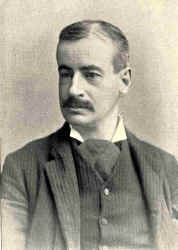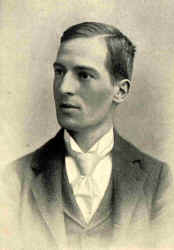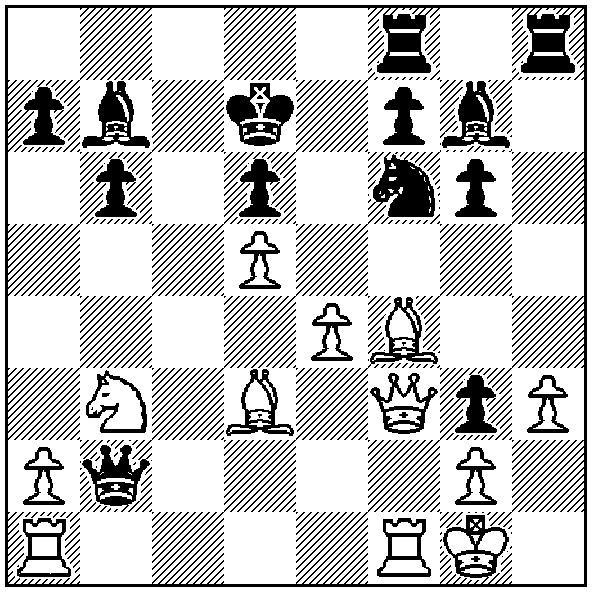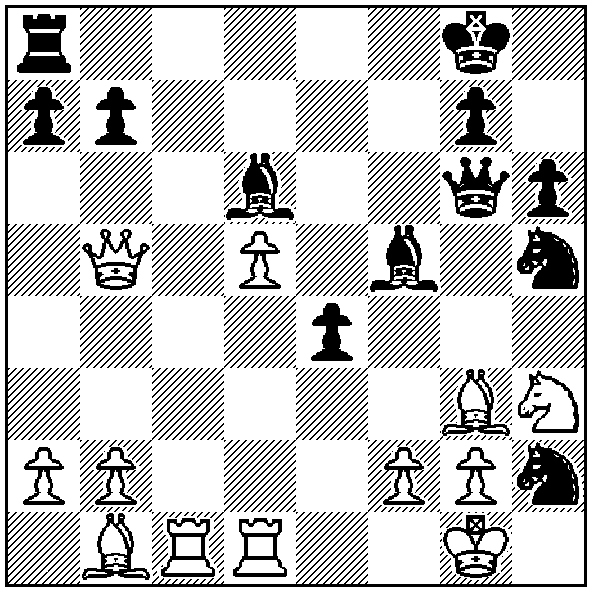|
Upper
row (from left to right): Wilhelm Steinitz, Mikhail Chigorin, and the
game between Steinitz and Joseph H. Blackburne. Second row:
Samuel Tinsley (left) against Harry N. Pillsbury (the position on the
board is after
White's 24th move), and lookers-on. Which game is pictured at the
right is unknown.
.
Americans
Are Evening Players
.
The
picture above was drawn on June 16, 1899. The scene of action was the
thirteenth round of the London International Tournament at St.
Stephen’s Hall, Royal Aquarium, Westminster.
The competitors in this meeting were (in alphabetic order): Henry E. Bird, Joseph H.
Blackburne, Mikhail Chigorin, Wilhelm Cohn, Dawid Janowsky, Emanuel
Lasker, Francis J. Lee, Géza Maróczy, James Mason, Harry N. Pillsbury,
Carl Schlechter, Jackson W. Showalter, Wilhelm Steinitz, Richard
Teichmann, and Samuel Tinsley.
Six games were played in the thirteenth round, of which four were decided in the
afternoon and two in the evening. The affair between the two players at
the front, Pillsbury and Tinsley, and the other game depicted, between
Blackburne and Steinitz, came to a conclusion in the afternoon. So did
the contests between Janowsky and Bird, and Maróczy and Chigorin. The
games Lee against Schlechter and Showalter against Cohn were decided in
the second sitting.
The playing hours of the tournament were from 12.00 p.m. to 4.30
p.m.,
and from 6.30 p.m. to 10.30
p.m.1 The time limit was fifteen
moves per hour, and the contestants had to play five days a week. One
day per week was reserved for playing out adjourned games. The
tournament lasted 42 days: it took place from May 30 till July 10.
Leopold Hoffer wrote about the
circumstances of the tournament:2
We have hardly witnessed a tournament in all our
experience in which the players have had such an easy time of it. The
games being finished every day, they have two clear days for rest weekly;
they also have almost the whole evening to themselves, as the games are
generally concluded at an early hour, with the exception of one or two
which may last till 9.30, or the utmost ten o’clock.
Hoffer's
statement that four to five games out of six were concluded within four
and a half hours, raises the
question: is this really true? Isn't this very fast? In regard to play on June 16 he was
right. Only two games were continued in the evening that day, but what
about the other days? And
were no games adjourned and finished every day?
The tournament book, the
leading English chess columns (The
Field, The Illustrated London News, The
Illustrated Sporting and Dramatic News, The
Penny Illustrated Paper and Illustrated Times, The Westminster Budget, etc.) and the only chess magazine at that
time (The
British Chess Magazine) did not give decisive answers to these
questions. In fact, they offered hardly details on these subjects.
The
author has therefore tried to reconstruct the play in the tournament
with the help of the reports in the daily newspapers The
Daily News, The Morning Post,
The Standard, and The Times
(May 31 – July 11).
The daily reports show
actually that four games were adjourned at the end of the
evening sittings. Three of them were drawn without further playing (round
1: Teichmann - Blackburne; round 2: Pillsbury – Teichmann; round 28:
Janowsky – Lasker), and one was played out on a bye day (round 25:
Mason – Cohn).
If we take in account that Hoffer’s opinion
was published in the paper of July 1, and that the adjourned game between
Cohn and Mason still had to be contested then, one could - more or less
- say that Hoffer was right on this point.
However, the daily reports also
demonstrate that at least 98 games of the 186
actually played3 in the double round tournament were
continued in the evening. The number could easily be higher, as it is not sure whether
eight games were finished in the first or second
sitting (a full list with particulars can be found below). The average
number of games that were continued in the evening was – at the very
least – 3.6 games, which is considerably more than the one or two Hoffer suggested.

 James
Mason, Harry N. Pillsbury James
Mason, Harry N. Pillsbury
The champion of evening play was Mason: he continued his game twenty
times (of 26 contested in the tournament) in the evening. Mason was
followed by two other Americans. Showalter finished nineteen of his 26
games in the second sitting, and Pillsbury, who played 27 games in the
tournament, also made an appearance at nineteen evenings.
To
shed some light on the opposite extremes: Tinsley finished most games in the first sitting: most likely twenty out
of 27 (whether one of his games was terminated in the afternoon or in the
evening is not clear). At least sixteen of Bird’s games were concluded in
the first sitting (at which time three of his 26 games were completed is shrouded in mist); and Steinitz
ended most likely fifteen
of his 26 games in the afternoon (the termination time of one of his
games is missing).
Perhaps age had a role in this.
The two sexagenarians, Bird and Steinitz, were the oldest contestants in
London. Tinsley was in his fifties.
Mason was not only the champion of evening play, he also made the
most moves in the tournament, Pillsbury again being close on his
heels. The average number of moves played by each competitor per game
was:4
|
Mason
|
50.1
|
|
Maróczy
|
43.1
|
|
Pillsbury
|
49.4
|
|
Teichmann
|
43.0
|
|
Janowsky
|
48.7
|
|
Tinsley
|
41.6
|
|
Bird
|
46.5
|
|
Lasker
|
41.3
|
|
Showalter
|
46.5
|
|
Chigorin
|
40.1
|
|
Blackburne
|
46.0
|
|
Steinitz
|
39.5
|
|
Cohn
|
45.3
|
|
Schlechter
|
38.6
|
|
Lee
|
44.6
|
|
Average
|
44.3
|
Bird and Tinsley had the reputation of being fast players. Their averages
(in relation to the few instances that they had to continue
their games in the second sittings) produce evidence for this claim.
The youngest player in the tournament made the fewest moves, while one of
the senior competitors had the highest mean of moves. This seems
somewhat remarkable, since it is generally assumed that young players have
more fighting spirit and stamina then their older opponents.
Perhaps, for the same reason,
it might be called special that Blackburne and Chigorin,
both of an advanced age at the time of the London tournament, played the
longest game. The Russian player won after 83 moves. Chigorin had also a role in the shortest game
of the tournament: Schlechter was beaten by him in seventeen moves.
The following is the list of players by seniority: Bird (born July 14,
1830), Steinitz (May 14, 1836), Blackburne (December 10, 1841), Tinsley
(January 13, 1847), Mason (November 19, 1849), Chigorin (November 12,
1850), Lee (1857), Cohn (February 6, 1859), Showalter (February 5,
1860), Janowsky (June 7, 1868), Lasker (December 24, 1868), Teichmann
(December 24, 1868), Maróczy (March 3, 1870), Pillsbury (December 5,
1872), and Schlechter (March 2, 1874).5
Janowsky celebrated his birthday during the London tournament. Whether it
was a happy day is doubtful: he lost his game against Tinsley
on his anniversary.
Back to the picture: the average of moves per game was 33 on
June 16, a number far below the average of the whole tournament. The
thirteenth round had several games of extremely short duration. The two games depicted
were among the shortest of the day: Pillsbury against Tinsley extended as
far as 26 moves, and the confrontation between Steinitz and Blackburne
came to an end after 31 moves. The
meeting between Janowsky and Bird, taking 24 moves, was another brief affair.
The two games
that were sketched:
Harry N. Pillsbury – Samuel Tinsley
-
London
International Tournament, Round 13
-
London,
June 16, 1899
-
B00
Uncommon King's Pawn Opening
1. d4
e6 2. e4 b6
It is difficult to understand why Tinsley should
persistently disregard the regular opening moves, seeing that masters
like Lasker, Pillsbury, Janowsky, and others adopt them. Here after
White's 2. e4 he has the French Defense. Why not continue the defense on
lines proved to be sound and sufficient, instead of playing the weak
Fianchetto Defense.
3. Bd3
Bb7 4. Ne2 Nf6 5. Nd2 d6 6. 0–0 Nbd7 7. f4 c5 8. c3 g6
Black seems to be fond of playing his bishops to
positions of safety.
9. Ng3
h5
Weak again. Bg7 and castles would be better.
10. f5
h4 11. fxe6
Breaking up Black's game at once.
11. ...
hxg3 12. exd7+ Kxd7 13. h3 cxd4 14. cxd4 Qe7 15. Qf3 Bg7 16. d5 Qe5 17.
Nb3 Raf8
Defending the bishop's pawn in order to release the
knight.
18. Bf4
Qxb2

It is quite clear that Black cannot withstand the
attack, and the game might be left here, except for Pillsbury's vigorous
and elegant termination.
19.
Bb5+ Kc8 20. Bxd6 Nxd5 21. Rac1+
If 21. exd5 Bd4+ 22. Nxd4 Qxd4+ 23. Kh1 Rxh3+ 24 .gxh3
Bxd5, winning the queen, and getting at least a draw.
21. ...
Kd8 22. Qxg3 Bd4+ 23. Nxd4 Qxd4+ 24. Rf2 Nf6 25. Be5 Nxe4 26. Bf6+
Resigns.
Source: The Book of the International
London Chess Congress 1899 (1900), page 163 (notes by Leopold Hoffer)
Wilhelm Steinitz – Joseph H. Blackburne
-
London
International Tournament, Round 13
-
London,
June 16, 1899
-
D20
Queen's Gambit Accepted
1. d4
d5 2. c4 dxc4 3. e4
Nf3, preventing Black's e5, is the proper course, as
Mr. Steinitz must surely have known.
3. ...
e5 4. d5 Nf6 5. Nc3 Bc5 6. Bxc4
As this pawn could not be defended, there was no need
to take it at once, and it would have been better to provide against the
coming attack by h3 or Bg5.
6. ...
Ng4 7. Nh3 f5 8. Bg5 Qd6 9. exf5
It was necessary to take the pawn, for if 9. f3, then
Ne3; and if 9 0–0, then f4, and White will lose his queen's bishop.
9. ...
Bxf5 10. 0–0 Qg6 11. Nb5 Bd6 12. Bh4 h6 13. Rc1 Nd7 14. Qe2 0–0
Pawn to a6 was good enough, but this is a finer
conception, as he intended to give up the exchange for the attack.
15.
Nxc7 Nb6 16. Nxa8 Rxa8
And here, again, Nxc4 would have satisfied most players,
but not Mr. Blackburne, even though he now loses two moves with his
knight.
17.
Rfd1 Nd7 18. Bg3 Ndf6 19. Bd3
White naturally seeks an exchange of pieces, but this
only loses time and does not accomplish it; he would, perhaps, have done
better to play Kh1, threatening f3.
19. ...
e4 20. Bb1
If 20. Bxd6 exd3 21. Qf1 Be5, with a powerful attack.
20. ...
Nh5 21. Qb5
An incomprehensible move, putting his queen out of play,
and allowing his skilful opponent to initiate a winning attack. 21. Bxd6
Qxd6 22. g3 appears to be a feasible if not quite satisfactory defense.
21. ...
Nxh2

22.
Bxh2
If Bxd6, then Bxh3 would be equally fatal.
22. ...
Bxh3 23. Qf1 Bxh2+ 24. Kxh2 Bg4 25. Rd4 Nf6 26. d6
Re1, or Qh1, would even now, perhaps have saved the
game.
26. ...
Qh5+ 27. Kg1 Be2 28. d7
For if Qe1, Ng4 wins at once.
28. ...
Ng4 29. d8Q+ Rxd8 30. Rxd8+ Kf7 31. Rd7+ Ke6
Resigns.
Sources: The
Westminster Budget, June 23,
1899; Penny Illustrated Paper,
June 24, 1899; The Field ,
June 24, 1899; The
British Chess
Magazine, July 1899, pages 307-308 (notes by Charles E. Ranken).
The
games in the 1899 tournament commenced exactly at 12.00 p.m.
every day, with the exception of May 30, and July 10. The delay on the
first day of play was half an hour and caused by the opening ceremony.6
Play opened late on the final playing day because the contestants had to
be photographed.7
Not
all players are on the picture that was taken that day: Mason, Pillsbury,
Showalter and Steinitz are missing. Pillsbury and Showalter had byes on
July 10, which possibly explains their absence. Why Mason and
Steinitz were absent, is a mystery.
|
